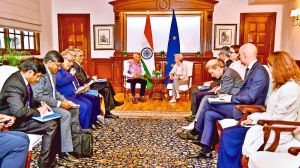MoS IT: Studying inputs, won’t rush with tabling data Bill
Speaking on the sidelines of the NIC Tech Conclave 2022, Chandrasekhar said the government was “clear and steadfast” on the need for the Bill to act as an enabler of the digital ecosystem.
 The Bill, which now includes non-personal data in its ambit, will simply be known as Data Protection Bill.
The Bill, which now includes non-personal data in its ambit, will simply be known as Data Protection Bill.The Ministry of Electronics and Information Technology is studying the inputs it has received on the draft of the data protection Bill and will not rush with the tabling of the Bill in Parliament, Minister of State for Information Technology Rajeev Chandrasekhar said.
🗞️ Subscribe Now: Get Express Premium to access the best Election reporting and analysis 🗞️
Speaking on the sidelines of the NIC Tech Conclave 2022, Chandrasekhar said the government was “clear and steadfast” on the need for the Bill to act as an enabler of the digital ecosystem. “As far as government is concerned, it is very clear, steadfast, we would like a data protection Bill. We would rather come up with legislations that are future proof and that are catalyst and create more fuel to startup success, rather than go by an artificial timeline, and create problems for our entrepreneurs and startups going forward,” the minister said.
Last December, the Joint Parliamentary Committee on Personal Data Protection Bill tabled its final report in Parliament. The Bill, which now includes non-personal data in its ambit, will simply be known as Data Protection Bill. It was introduced in Lok Sabha on December 11, 2019 by then Telecom Minister Ravi Shankar Prasad and referred to the standing committee five days later.
The government’s thought process behind the legislation is that it should provide momentum of growth to the digital economy rather than creating problems.
The Ministry, he said, was being “extremely careful” with the legislation so that it improves momentum of growth of the digital economy rather than creating any problems.
- 01
- 02
- 03
- 04
- 05































